Did you know that Truthout is a nonprofit and independently funded by readers like you? If you value what we do, please support our work with a donation.
 (Image: OBI; Mexico / CartoonArts International / The New York Times Syndicate) Matthew Yglesias at Vox recently wrote a generally very good article on the euro zone story so far, in which he explains that a combination of whatever-it-takes financial intervention and political commitment has stabilized the financial situation, but the economy and the unemployed have suffered terribly.
(Image: OBI; Mexico / CartoonArts International / The New York Times Syndicate) Matthew Yglesias at Vox recently wrote a generally very good article on the euro zone story so far, in which he explains that a combination of whatever-it-takes financial intervention and political commitment has stabilized the financial situation, but the economy and the unemployed have suffered terribly.
But even Mr. Yglesias is somewhat taken in by the intense propaganda that portrays the crisis as mainly fiscal. Namely, he says that the adoption of the euro, and the resulting low borrowing costs, led to “irresponsible budgeting” in Italy.
Sorry, but no (and when it comes to almost any fiscal issue, you always, always want to check the numbers yourself, not rely on what all the reporting seems to say). Italy’s high debt is a legacy of policies put in place long ago (see the chart). The country’s debt position actually improved during the euro boom years, and only worsened again recently thanks to the economic crisis.
In reality, here is the full list of countries for whom the argument that fiscal irresponsibility led to the euro crisis makes any sense at all: Greece.
The truth is that Spain and Ireland were models of fiscal responsibility from 2000 to 2007, or so it seemed, and Italy wasn’t too bad. If you imagine otherwise – if you think you’ve heard that fiscal irresponsibility was more widespread than that – blame bad reporting.
Already in the Trap
The economist Dean Baker, reacting in his blog to a recent New York Times article by Neil Irwin on the deflation threat in Europe, feels that he needs to make the perennial point that zero inflation is not some kind of economic Rubicon. Below-target inflation is already a problem, and a very serious problem for countries that don’t have an easy way to provide economic stimulus.
Think about it. Suppose that a country has a 2 percent inflation target, but its central bank has already cut interest rates close to zero and the inflation rate is 1 percent and falling. Then that country is already experiencing a cumulative process that will pull it deeper into the trap unless it gets lucky.
How so? As inflation falls, real interest rates will rise, tending to depress the economy further. Also, debtors will find their debt growing because inflation isn’t as high as they expected, so that the country would have a debt-deflation cycle even if it didn’t yet have deflation.
So Europe’s low and falling inflation isn’t a problem because it might turn into deflation – it’s a problem because of what it’s doing right now.
Oh, and a word on Sweden, where the economy is indeed on the edge of deflation, but where officials say never mind because output is currently growing. Um, does the central bank have an inflation target or doesn’t it? Yes, the economy can expand some of the time even if inflation is below target – but because the inflation rate is low, there isn’t as much room to respond to adverse shocks. So missing the target is a policy failure whatever the current output indicators.
Anyway, back to the euro zone: the problem is not that something could go wrong, but the fact that it already has gone wrong. And remember, above all, that the risks aren’t symmetric. Controlling inflation may be painful, but we do know how to do it.
Exiting deflation or lowflation is really, really hard, which is why it should be avoided.
Press freedom is under attack
As Trump cracks down on political speech, independent media is increasingly necessary.
Truthout produces reporting you won’t see in the mainstream: journalism from the frontlines of global conflict, interviews with grassroots movement leaders, high-quality legal analysis and more.
Our work is possible thanks to reader support. Help Truthout catalyze change and social justice — make a tax-deductible monthly or one-time donation today.